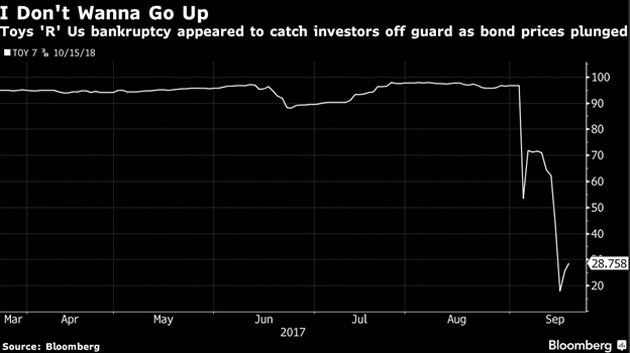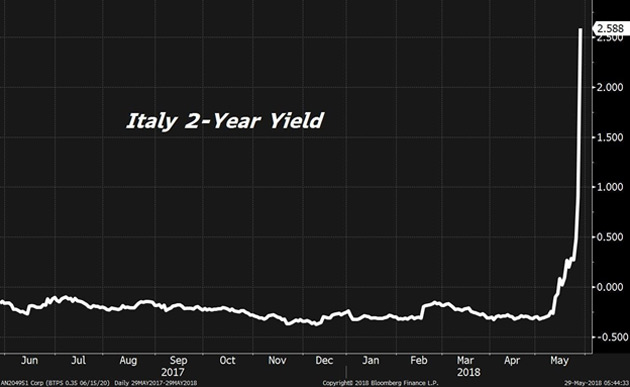| -- | May 31, 2018 Wall Street Fired Too Many People  Everyone knows that Toys “R” Us went bankrupt. Very sad. And largely preventable (we will save the private equity conniption for another week). But that’s not the story I’m interested in. I don’t care that Toys “R” Us went bankrupt—I care how they went bankrupt. One day the bonds were trading at 96. The next day they filed, and a few days later, the bonds were trading at 20. Bam. Just like that. That is not usually how things work in credit markets. Usually, smart analysts study a company and figure out well in advance of the bankruptcy that bankruptcy is a possibility. Sometimes these analysts know the company better than even management does. The analysts tell their traders that the company is doomed, and the traders short the bonds, knocking down the price. Then word starts to spread that there might be a problem, then other analysts will study the company and other traders will short the bonds, and by the time the actual bankruptcy happens, it is a foregone conclusion. That is what happens with efficient markets. Okay, everyone knows that markets are not really efficient, but look at this freaking chart.  I would argue that markets are less efficient than they were ten years ago. Wait, aren’t markets supposed to get more efficient over time? It isn’t working out that way. Pack Your Stuff, Skippy My diagnosis is as follows. There are fewer people analyzing securities than there used to be. Basically, banks and big hedge funds are spending lots of money on technology and less and less on human capital. Co-locating servers so you have a 3-microsecond latency is sexy. Some 31-year-old dude from Wharton sitting in his office until midnight, ordering Seamless, poring over company filings, is not sexy… but that is how you figure out that there is a problem at Toys “R” Us. All the computational power in the world isn’t going to help you. Of course, as I say this, some quant reading this letter is pretty certain he can program a robot to take the analyst’s job. You know, some things you just can’t (and shouldn’t) automate. I don’t really know if there are fewer securities analysts—the last job counts I saw on Wall Street had employment levels pretty much unchanged over ten years. Certainly, there are boatloads of people taking the CFA exam. Which brings me to point number two. There is another possibility: securities analysts are dumber than they used to be. I am going to go on the record here and say that the CFA might not be a good thing. For one reason: it encourages groupthink. We are teaching hundreds of thousands of people to look at the market in exactly the same way. I would also argue that it doesn’t teach security analysis—it teaches you how to take an exam. Think about it: all the hundreds of thousands of CFAs that we’ve minted over the years, and the business of analyzing markets has gotten worse, not better. The Market Is as Efficient as a Cloth Diaper Toys “R” Us bonds are not the only instantaneous blowup in the capital markets. Can you think of another? How about… Italy? 
Source: @daniburgr The result of the election was a bit of a surprise, but seriously, who is caught off guard here? Everyone knew that this was a possibility. The convexity is massive, mostly for structural reasons, as the ECB has spent the last 7 years selling options (implicitly). But again, one day Italy is fine, the next day Italy is a problem. There is an old saying—when everyone thinks alike, no one is thinking. The lesson here is that the market is extremely short-term efficient, but not at all efficient in the long-term. Day trading is stupid and pointless. Your time horizon on a trade should be 1-5 years, or more. I said this in the very first issue of ETF 20/20: you should be aiming to get rich in a slow, deliberate, and sustainable way. And if that sounds good, maybe you should consider joining us. These knuckleheads trying to scalp stocks on their Robinhood apps for a couple of hundred bucks are why we can’t have nice things. Don’t get me wrong—there was a point in time where day trading used to be profitable. Like, 20 years ago. Which brings up another pet peeve of mine. I have met so many people over the years whose goal it is to “trade for a living.” That should not be your goal. You know why not? Because trading for a living sucks. The funny thing about Warren Buffett is that as successful as he is, nobody really makes a serious attempt to emulate what he does. Because it requires patience. If I were running $3 billion, I’d hire 15 analysts with undergraduate majors in things like music and anthropology and give a big bonus to whomever came up with the stupidest idea. 
Jared Dillian
Editor, The 10th Man
 | Get Thought-Provoking Contrarian Insights from Jared Dillian
Meet Jared Dillian, former Wall Street trader, fearless contrarian, and maybe the most original investment analyst and writer today. His weekly newsletter, The 10th Man, will not just make you a better investor—it's also truly addictive. Get it free in your inbox every Thursday. |
Jared's premium investment service, Street Freak, is available now. Click here for our introductory offer. Jared Dillian, former head of ETF Trading at one of the biggest Wall Street firms and author of the highly acclaimed books, Street Freak: Money and Madness at Lehman Brothers , and All the Evil of This World , shows you how to pick and trade trends, and master your inner instincts. Learn how to use “Angry Analytics” as a leading indicator of budding trends you can profit from… and how to view any market situation through the lens of a trader. Jared’s keen insight into market psychology combined with an edgy, provocative voice make Street Freak an investment advisory like no other. Follow Jared on Twitter at @dailydirtnap. Share Your Thoughts on This Article
 http://www.mauldineconomics.com/members
Use of this content, the Mauldin Economics website, and related sites and applications is provided under the Mauldin Economics Terms & Conditions of Use. Unauthorized Disclosure Prohibited The information provided in this publication is private, privileged, and confidential information, licensed for your sole individual use as a subscriber. Mauldin Economics reserves all rights to the content of this publication and related materials. Forwarding, copying, disseminating, or distributing this report in whole or in part, including substantial quotation of any portion the publication or any release of specific investment recommendations, is strictly prohibited.
Participation in such activity is grounds for immediate termination of all subscriptions of registered subscribers deemed to be involved at Mauldin Economics’ sole discretion, may violate the copyright laws of the United States, and may subject the violator to legal prosecution. Mauldin Economics reserves the right to monitor the use of this publication without disclosure by any electronic means it deems necessary and may change those means without notice at any time. If you have received this publication and are not the intended subscriber, please contact service@mauldineconomics.com. Disclaimers The Mauldin Economics website, Yield Shark, Thoughts from the Frontline, Patrick Cox’s Tech Digest, Outside the Box, Over My Shoulder, World Money Analyst, Street Freak, ETF 20/20, Just One Trade, Transformational Technology Alert, Rational Bear, The 10th Man, Connecting the Dots, This Week in Geopolitics, Stray Reflections, and Conversations are published by Mauldin Economics, LLC. Information contained in such publications is obtained from sources believed to be reliable, but its accuracy cannot be guaranteed. The information contained in such publications is not intended to constitute individual investment advice and is not designed to meet your personal financial situation. The opinions expressed in such publications are those of the publisher and are subject to change without notice. The information in such publications may become outdated and there is no obligation to update any such information. You are advised to discuss with your financial advisers your investment options and whether any investment is suitable for your specific needs prior to making any investments.
John Mauldin, Mauldin Economics, LLC and other entities in which he has an interest, employees, officers, family, and associates may from time to time have positions in the securities or commodities covered in these publications or web site. Corporate policies are in effect that attempt to avoid potential conflicts of interest and resolve conflicts of interest that do arise in a timely fashion.
Mauldin Economics, LLC reserves the right to cancel any subscription at any time, and if it does so it will promptly refund to the subscriber the amount of the subscription payment previously received relating to the remaining subscription period. Cancellation of a subscription may result from any unauthorized use or reproduction or rebroadcast of any Mauldin Economics publication or website, any infringement or misappropriation of Mauldin Economics, LLC’s proprietary rights, or any other reason determined in the sole discretion of Mauldin Economics, LLC. Affiliate Notice Mauldin Economics has affiliate agreements in place that may include fee sharing. If you have a website or newsletter and would like to be considered for inclusion in the Mauldin Economics affiliate program, please go to http://affiliates.ggcpublishing.com/. Likewise, from time to time Mauldin Economics may engage in affiliate programs offered by other companies, though corporate policy firmly dictates that such agreements will have no influence on any product or service recommendations, nor alter the pricing that would otherwise be available in absence of such an agreement. As always, it is important that you do your own due diligence before transacting any business with any firm, for any product or service. © Copyright 2018 Mauldin Economics | -- |
